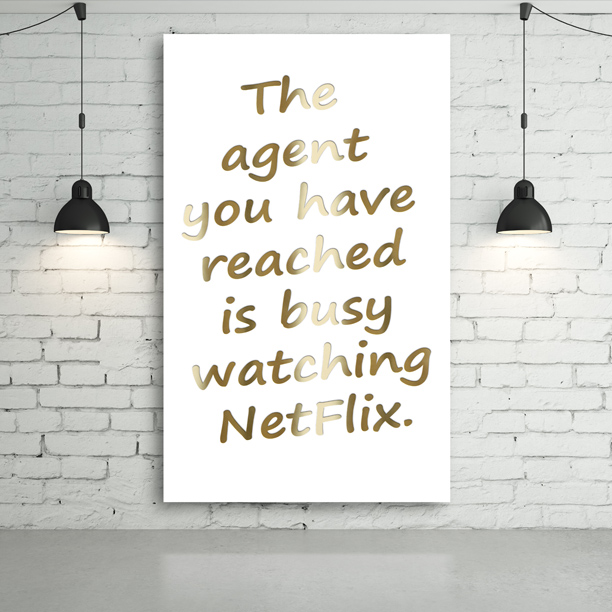Ever since the introduction of the smartphone (we’re looking at you Apple and Android) we’ve shifted into a hyper on-demand climate. Everyone worries that if they don’t take that one call, or respond to an email or text message instantly that they’ll lose out on precious business to the next person who has no problem stepping away from the family dinner table when duty calls.
It’s a crazy world out there and fast paced is no longer fast enough. Let’s face it, we’ve all become cozy with the idea of getting what we want as soon as internetly possible. This is especially true when you’ve exhausted all of your online researching, perusing, price checking, and due diligence and you finally make the decision to talk to a real live human. As consumers we think, okay I’m ready now, and you Mr.Salesperson better be damn ready for me.
However, what happens more often than not is unexpected frustration for the consumer. Typically most consumers don’t get around to the real, dig into the depths of your browser, kind of online shopping until the late evening hours. This only leaves them with a few options for reaching out and touching someone:
• The dreaded contact form
• The email address that may or may not be accurate
• Live chat that may or may not have an available operator
• Social media
• Text messaging
• Answering service
Let’s look at all of these solutions and figure out which one is best for your business, your clients and more importantly the life you’re trying to live.
 The contact form:
The contact form:
The contact form can be a big pain in the ass for everyone. From spam protection verifications that require a degree and 30/20 vision, to the mandatory request of every small detail short of a blood sample, contact forms are crazy out of date and incongruent with how the general population wants to do business these days. To top it all off, contact forms are a one way street. Consumers can hit send all day long on a contact form only to be met with the generic “Thank you for your request. Someone will get back to you within 24 hours.” Are you kidding? Someone? 24 hours? That’s like an entire day to wait for…who again? In today’s day and age you better have a name or alias assigned to your “someone” and if you’re really into keeping your contact form around in its current state then you should probably endeavour to cut that response down by 23 hours at the least. Or you’re right, you’ll totally be losing customers to someone more responsive. Even better, upgrade your form with options. For example, when they click submit give them other options to escalate their request, either by using live chat or even an unpublished number where they can reach you directly.
The outdated email address:
How many of you have set up websites and thought this: I really want to seem bigger than I actually am right now, because you know, one of these days business is really going to take off and I won’t want my personal email address out there, so I’m going to use a generic info@ or support@ or somethingelseIwillnevercheck@? Yeah well that’s likely already caught up with you and you don’t even know it yet. People don’t want to do business with strangers. That’s why they spend so much time researching you, reading about you and essentially online stalking you in the first place. You kind of miss the point when you set up an alias email address, especially when you’re likely to change, add or remove a hardware device from your repertoire, forget to add or forward said alias and then miss all leads that are supposed to direct to it. You’re much better off using your own day to day email address and coming up with a better lead management system.
Live Chat:
Live chat is a great option so long as it also reflects how you handle business offline. If you’re going to use live chat and you’re interested in the scheduling option, then you need live chat that disappears from your site when it’s not available. Misleading your potential clients with the potential of live chat only for them to click and see the hours they’ve decided to engage with you are not congruent with your schedule ups the consumer frustration ante significantly. When you enable scheduling in SYNCRO the chat window will disappear during the hours you are not available. This will force clients to contact you in another manner. If you choose not to enable scheduling and you’re using SYNCRO then you can also rely on your chat triggers to save you when you’re busy binge watching HBO at night. Setting your chat trigger to respond to clients within 60 seconds with a message detailing why you can’t respond and when you will likely respond is usually enough to keep a client at bay. It also gives you peace of mind that your leads are getting some attention while you dig into that season finale. The lead’s contact information will be there for you via text message, email and your admin panel if you want to personally follow up during a snack run to the kitchen.
Social Media:
Let’s face it we weren’t all built for the rigours of social media. Being connected to social media 24/7 for some is like second nature, and for others it’s a circle of hell that has yet to be classified. Again it’s really important to tell your clients how you use social media in your offline life. If you’re not a regular social enthusiast who awaits every ping and ding signifying a new notification, then you may want to put that out there to your clients before they think to engage you with a direct message (DM) that you’re only going to check twice a year. Add a note to your contact page that explains how you use social media and how and when you prefer to engage with your clients. More importantly how can potential clients reach you (if at all) after “normal” hours?
Answering Service(s):
An answering service is like technology’s definition of a lunch bag let down. There’s nothing worse from a consumer’s perspective to finally reach a real live human only to realize that said human has no information that they want or can use. Answering services have their place and that place is in a service based emergency scenario. Your HVAC is broken and you have no heat in the dead of winter, your house is flooding, or you have a personal emergency that requires an immediate dispatch. Answering services were designed to provide some level of comfort to the caller while taking important contact details in order to send out appropriate teams as soon as possible. Using an answering service for your live chat to “pre-qualify” your online leads or to handle your cell phone calls for sales inquiries is frankly pretty vain. It tells the consumer that you’re too busy to deal with them unless they have been vetted as worthy. It’s very presumptuous and you run the risk of losing great potential leads, considering online consumers don’t want to give away as much information these days due to privacy concerns. If they feel as though they aren’t a priority right from the start they’ll likely snub you before you have a chance to snub them back. Use an answering service with caution and again making a quick note on your contact page informing your potential clients of what they can expect when they call after 5pm will go a long way in the quest for transparency.

